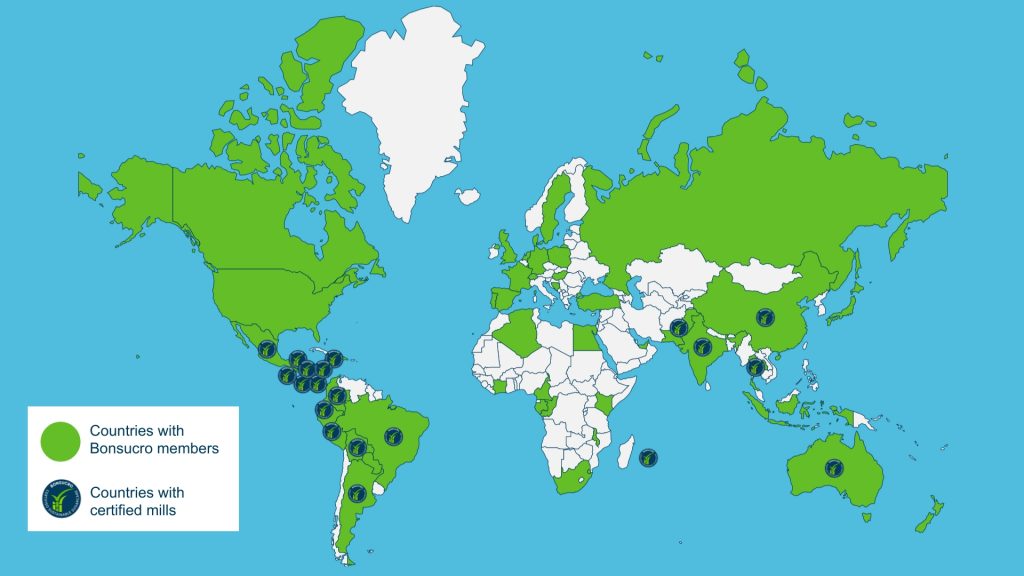27th October 2021
Bonsucro has one main purpose: to collectively accelerate the sustainable production and uses of sugarcane.
Ten years ago, our member Raízen achieved a big milestone as it was the first organisation in the world to become Bonsucro certified. Its Maracaí Mill in São Paulo State, Brazil, successfully passed the audit against the first version of the Bonsucro Production Standard.
“This will change the sugarcane industry forever,” said Kevin Ogorzalek, former WWF-US programme officer and former Chairman of the Bonsucro Board, following Maracaí’s certification.
Since then, Raízen has gone far on its sustainable sugarcane journey, with 22 of its 23 operating mills now certified.
In the past decade, Bonsucro has gone from strength to strength – driving change in a sector with critical importance for over a hundred countries and thousands of communities. We have done this by building a global community of actors that deliver positive environmental and social impact along the supply chain.
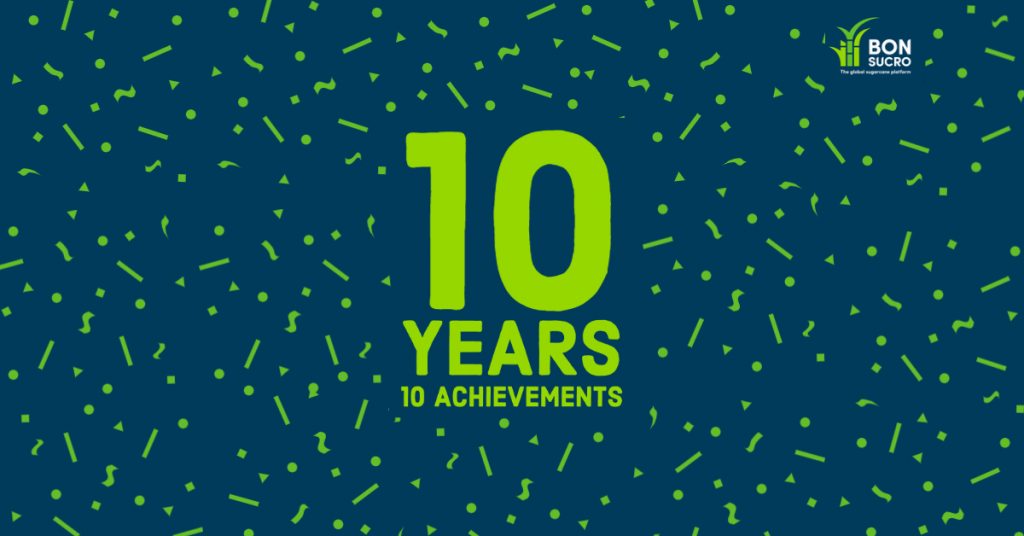
Ten years after the first certification, we look back at ten achievements that have marked the sector.
- We’ve built a global and highly committed network
- Market demand for certified products is growing
- Over 10,000 smallholders have joined the sustainable supply chain
- Our standards and programmes have spurred safer workplaces
- We’ve catalysed climate action in the sector
- We’ve created a robust governance system
- We’ve launched innovative projects
- Bonsucro Credits have opened up the sustainable supply chain
- The Bonsucro logo is increasingly used
- Bonsucro’s Standard complies with the European biofuel legislation
1. We’ve built a global and highly committed network
Bonsucro has created a global community of 280 members across the whole sugarcane supply chain, including some of the world’s biggest brands like Ferrero, Unilever and Nestlé.
Together with our members, we champion sustainability. Through our Production and Chain of Custody Standards, certified sustainable sugarcane has been made available worldwide, with 138 certified producers and 73 certified traders and buyers from 33 countries.
As the climate crisis grows and challenges from COVID-19 persist, we call those working in the sugarcane sector around the globe to make sustainable practices mainstream.
2. Market demand for certified products is growing
Sugarcane has a diverse range of food and non-food derivatives, and end uses, fuelling continued market development.
Its versatility has attracted many sectors to support the objectives of Bonsucro. Every year, sales of certified products have increased, with raw sugar reaching almost 10 million metric tonnes and ethanol exceeding 1.36 million m3 over the decade. In addition, demand for sugarcane derivatives has increased for use in bioplastics, biochemicals and rum. As the sale of certified products gains momentum, it gives businesses the confidence to invest in, and promote sustainability.
3. Over 10,000 smallholders have joined the sustainable supply chain
Some of the world’s biggest sugarcane producing countries rely on smallholder farmers for most of their volumes. Considering the beneficial impact of sustainability for smallholders, we’ve worked hard to empower these farmers to access sustainable practices and safer working conditions, and to better protect them and their dependents.
To widen access to certification, in 2018 we launched the Production Standard for Smallholder Farmers. It is based on our rigorous Production Standard, but has been adapted to facilitate collecting data on a reduced scale to minimise the cost of implementation.
To further drive inclusivity and resilience among smallholders, we work with members such as PepsiCo to offer guidance and deliver impact projects in countries where smallholder farmers are vital to the sugarcane sector, such as Mexico and Pakistan.
Until now, 10,814 smallholders in Pakistan, Mexico, Brazil and Thailand have been certified against the Bonsucro Smallholder Standard, covering over 39,000 hectares of land. However, we will offer the necessary support to increase this number.
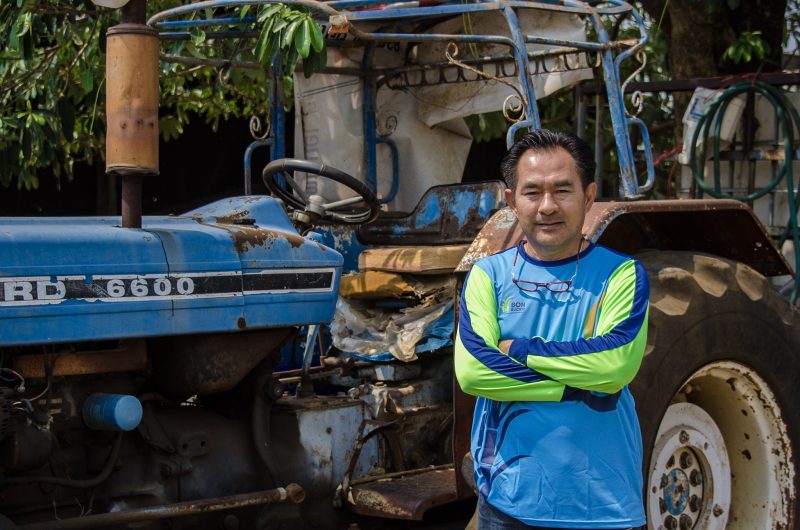
Watcharin Banthat-thiang, a Bonsucro certified smallholder in Saraburi province, Thailand
4. Our standards and programmes have spurred safer workplaces
Sugarcane workers may experience risks including fire hazards, toxic substances, repetitive actions, heavy load lifting, overexposure to sunlight and heat stress. That’s why protecting workers’ human rights and promoting a healthy, safe workplace is a vital component of the Bonsucro Production Standard, which includes several indicators on workers’ safety.
For instance, the accident rate indicator requires that certified producers don’t exceed 15 accidents per million hours worked in the mill, and 45 accidents in the field during the same time period. Data from our certified members shows that the longer mills have held Bonsucro certification, the lower the accident rate at farm and mill level. From the year of initial certification to five years after initial certification, accident rates dropped by 38% at farm level and by 18% at mill level (2019).
Besides, in response to the harmful effects of heat stress and Chronic Kidney Disease as non-traditional origin (CKDnt) among sugarcane workers, we co-founded the Adelante Initiative with La Isla Network (LIN), San Antonio Mill, and the National Committee of Sugarcane Producers of Nicaragua (CNPA). Through this platform, we have been evaluating and improving manual labour work practices and participated in raising awareness of the conditions within the global sugarcane sector.
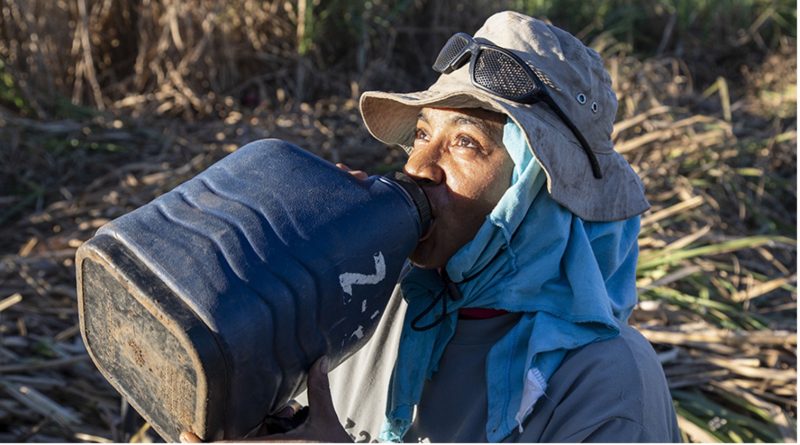
Photo: Ed Kashi for La Isla Network
5. We’ve catalysed climate action in the sector
Reducing the environmental impact of sugarcane is central to our work. As a certification system and a change platform, we’ve helped to decarbonise the sugarcane sector through the environmentally responsible practices required in our Production Standard.
Audits of Bonsucro-certified producers have revealed year-on-year reductions in GHG emissions and water use. This is supported by third-party research; one study that uses a sample of Bonsucro-certified mills and farmers in Brazil indicated a 31% reduction in GHG emissions at farm level and 20% in mills over the first four years of certification. The same study showed that certification also leads to reductions in water, fertiliser and herbicide use and pre-harvest sugarcane burning.
On average, certified mills reduce their CO2 emissions by 5.5% after just one year of certification. Bonsucro has also found that certified operators collectively avoided approximately 200 million kg CO2 from entering the atmosphere during their first year of certification – which equates to planting 10 million pine trees to absorb carbon dioxide.
6. We’ve created a robust governance system
A reliable governance structure has helped us establish credibility across the world. In the past ten years, we have created a Members’ Council, a Technical Advisory Board and a Finance and Risk Committee.
We also believe it’s vital to have a reliable process to raise incidents. The Bonsucro Grievance Mechanism was updated in 2020 to meet international human rights standards. It provides a safe space for workers and stakeholders to complain against the action or inaction of members, should the need arise. It is designed to enable us to manage complaints in a fair and inclusive way and formal complaints are managed independently by the Centre for Effective Dispute Resolution.
To encourage due diligence and best practices in line with the UN Guiding Principles on Business and Human Rights, we also strengthened our Code of Conduct for members.
7. We’ve launched innovative projects
Over the years, Bonsucro and partners have developed successful, replicable targeted programmes to build capacity with mills and smallholders worldwide. In this time, we have channelled over £2million into impact projects.
Some examples of our impact projects include:
- South Africa: we are developing a methodology using data from Bonsucro, the Better Cotton Initiative and the Alliance for Water Stewardship to inform decision makers at banks on the sustainability profiles of their clients, enabling them to reward sustainable business practices.
- Brazil: we are engaging with the Brazilian government to develop an integrated procedure for the biofuel policy, RenovaBio, and Bonsucro certifications to promote both systems to a wider group of producers and encourage environmental sustainability and climate transition.
We are currently developing the Bonsucro Impact Fund to further invest in initiatives and projects that catalyse or accelerate sustainable sugarcane production. This will launch in 2022.
8. Bonsucro Credits have opened up the sustainable sugarcane supply chain
Conscious that market access can be a challenge for sugarcane producers, we launched Bonsucro Credits in 2012, a system that bypasses complex global supply chains and connects producers and buyers directly.
Credits are a straightforward way for certified producers to sell directly to companies at the end of the supply chain, and for buyers to support sustainable production. A portion of fees from Bonsucro Credit sales are invested directly in initiatives for other farms and mills to adopt more sustainable practices through the Bonsucro Impact Fund.
In 2019, we launched the Credit Trading Platform, a dedicated marketplace to connect producers and buyers and facilitate the sale of credits. Since it launched, members have sold 1,411,443 tonnes of raw sugar, 162,300 tonnes of sugarcane, and 155,257 of ethanol credits. At the end of 2020, Barry Callebaut completed the first trade of sustainable sugarcane credits from forty independent farmers from the Brazilian associations Socicana and Assobari.
Since the launch of credits in 2012, more than 2.5 million credits were sold and the number of mills selling credits continues to grow year-on-year.
9. The Bonsucro logo is increasingly used
The Bonsucro logo allows certified members to communicate about the use of sustainable sugarcane materials.
While the use of the label isn’t mainstream, it can be seen on an increasing number of products, from Tetra Pak packaging to rum bottles, snacks and sugar bags. The increasing global demand has meant we have translated the logo into 23 different languages including Japanese, Chinese, Russian, Serbian, French and German.
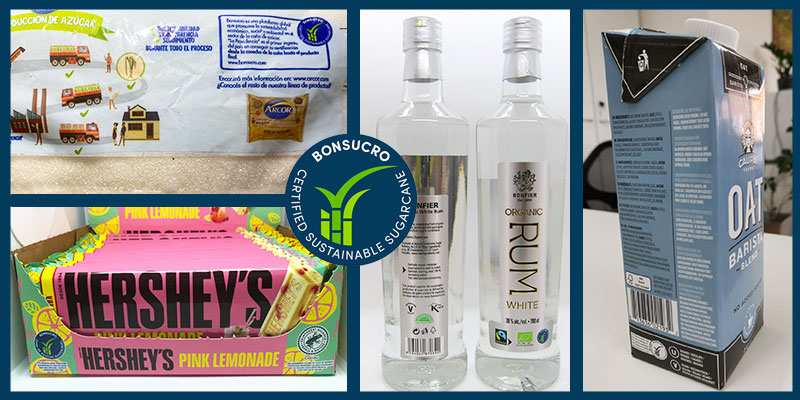
10. Bonsucro’s Standard complies with the European biofuel legislation
Sugarcane ethanol is used in many countries as a renewable fuel but to import ethanol into Europe, it must be produced in compliance with the EU Renewable Energy Directive. We developed the Bonsucro EU-RED Standard as a voluntary add-on for sugarcane producers that export ethanol to Europe.
The European Commission recognised Bonsucro’s compliance with the EU RED, and more recently with the EU RED II.
*Under the recast Renewable Energy Directive (EU) 2018/2001, commonly referred to as EU RED II, the EU sustainability criteria have been extended to cover biomass for heating and cooling and power generation.
Let’s change the sugarcane sector for good
Collectively, we have achieved a lot over the last decade. But we are excited to make an even bigger impact in the next ten years and beyond.
We look forward to working with existing and future members towards the ambitious targets set in our 2021-2026 strategic plan.
We will only succeed in our mission by reaching as many stakeholders as possible and by collaborating, which is why we invite everyone in the sugarcane sector to join us.



